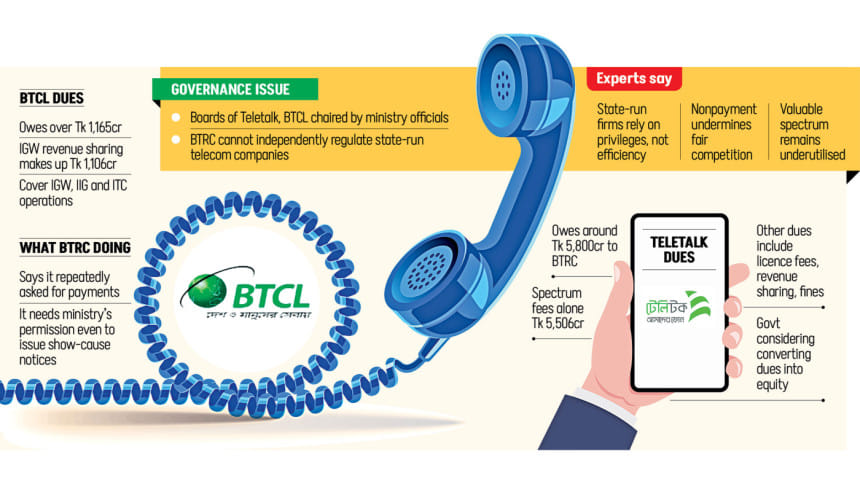Originally posted in The Daily Star on 22 September 2025
Teletalk, BTCL sit on Tk 7,000cr dues amid weak oversight

While private telecom operators consistently meet their financial obligations to the regulator, two state-run entities have failed to do so over several years, with a staggering Tk 7,000 crore left unpaid, raising questions about preferential treatment in the sector.
According to official documents seen by The Daily Star, Teletalk Bangladesh Ltd and Bangladesh Telecommunications Company Ltd (BTCL) have failed for years to clear dues that include licence fees, revenue sharing, spectrum charges, administrative fines, value-added tax (VAT), and social obligations.
Bangladesh Telecommunication Regulatory Commission (BTRC) officials said the total could exceed Tk 10,000 crore if VAT and late fees are included.
Private mobile operators, by contrast, regularly pay their dues, sometimes with added interest for minor delays. Similarly, small and medium telecom enterprises face fines, licence cancellations, or service restrictions if they fall behind. Such measures have rarely been enforced against the state-run firms.
Of the outstanding amounts, Teletalk alone owes around Tk 5,800 crore. Of this, licence fees account for Tk 120 crore, revenue sharing Tk 102 crore, spectrum fees Tk 5,506 crore, and other dues around Tk 62 crore.
BTCL’s liabilities exceed Tk 1,165 crore. The largest component is revenue sharing from its international gateway operations, amounting to Tk 1,106 crore, which should have been directly paid to the BTRC.
According to the documents, the BTRC has repeatedly requested payment over the years. The latest demand to BTCL was made on June 24, 2025, and to Teletalk on June 2, 2025. The companies are yet to settle their arrears.
BTRC officials said copies of these letters will also be sent to the adviser and secretary of the Posts and Telecommunications Ministry, which oversees the operations of these state-owned firms, for further action.
Teletalk, in a statement, said that it is a state-owned company, and therefore, the capital investment for its spectrum can be considered an investment from the government as the owner.
“To settle the outstanding dues against the allocated spectrum, the Posts and Telecommunications Division has submitted a proposal to the Ministry of Finance to convert the entire outstanding amount into equity in line with Teletalk’s request.
“If the proposal is approved, it will be possible to resolve Teletalk’s outstanding spectrum-related liabilities,” it added.
UNEVEN PLAYING FIELD
Analysts and regulatory experts warn that the unpaid dues not only deprive the exchequer of critical revenue but also distort competition in the telecom market.
“Private operators are required to follow strict rules, but public companies frequently escape such obligations, leading to market discrimination,” said Khondaker Golam Moazzem, research director at the Centre for Policy Dialogue (CPD).
“The large sums of unpaid dues raise questions about whether these firms could survive in a truly competitive market,” he said, noting that these companies often rely on government privileges rather than efficiency.
The policy expert also stated that state-owned companies generally have a poor record of operating in competitive market structures.
Yet, he pointed out that state-owned firms still hold a share of the telecom market. “But their participation undermines the overall competitive structure, creating an uneven playing field.”
“BTRC should adopt a common principle, ensuring equal treatment of both public and private operators, whether in providing facilities or imposing penalties,” Moazzem said.
Telecom analyst Abu Nazam M Tanveer Hossain argued that continuing to subsidise Teletalk, despite its negligible market share and inefficiencies, serves little purpose. “Even government officials themselves do not exclusively use Teletalk, which means it cannot credibly be called a tool for safeguarding national security.”
Instead of letting scarce and valuable spectrum resources go underutilised, he suggested reallocating them to operators with higher demand to improve service quality, enhance customer benefits, and increase government revenue.
Hossain also said the government should either privatise part of Teletalk by converting it into a specialised intermediary service provider for functions like interconnection or gateway, or restructure it as a fully commercial operator with professional management and competitive targets.
He also recommended transferring a majority of its shares to private investors to overhaul efficiency as an option.
Asked about the BTRC’s discriminatory role in collecting revenue, Md Emdad Ul Bari, chairman of the commission, said the regulator is repeatedly informing the ministry about the dues of the state-run companies through letters.
“But as per the current law, we have to take prior permission from the ministry for any decision. Besides, the chairmen of these companies’ boards come from the ministry. We even have to take the ministry’s permission to send a show-cause notice to these companies,” he added.


